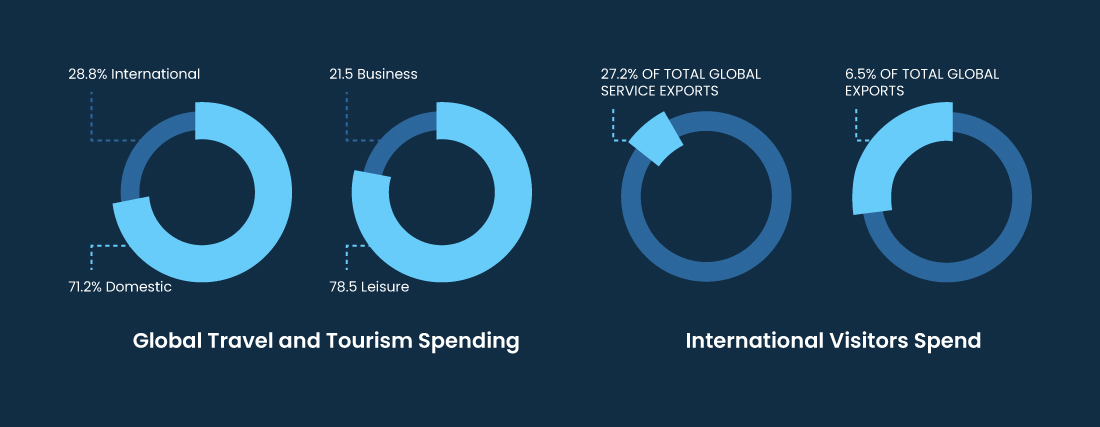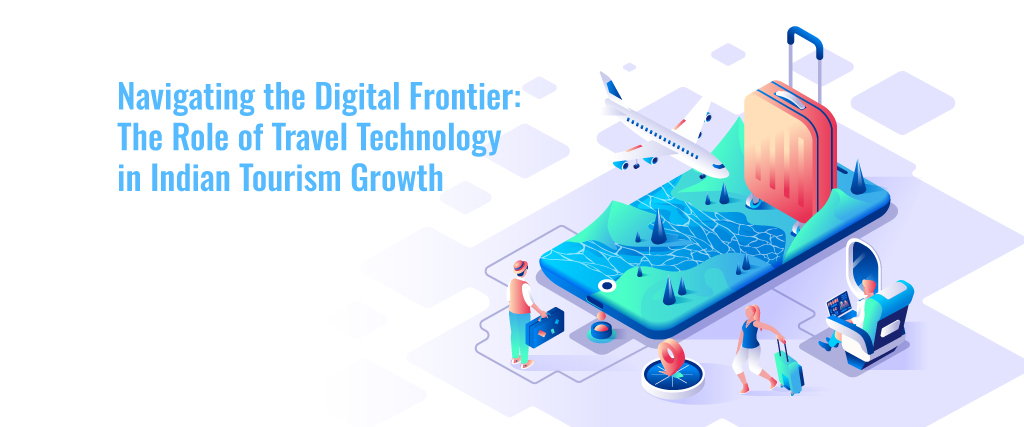The travel industry is at the forefront of innovation in this era of rapid technological advancement, changing how we plan, experience, and remember our travels.
Travel technologies have evolved into essential partners, boosting every aspect of the travel ecosystem, from the first inspiration to the immersive experiences while traveling.
This blog takes you on a tour of the rapidly changing travel technology market and explains how these innovations have completely changed how we see the world.

Technology in the present scenario
The travel and tourism sector is highly dependent on technological advancements.
The travel industry is changing significantly as a result of the development of technology.
Profitability and customer satisfaction can both gain from it.
Technology advancements have made it possible for travel agencies to provide their clients with a better experience.
To enhance customer satisfaction and other aspects of their business, travel industry companies are expanding and implementing new technologies, which has led them to turn to digital lenders for business loans.
Here are some of these that are covered:
1. Online Booking Platforms:
An important development in the ever-changing world of contemporary travel is the rise of online booking platforms.
The way people arrange and plan their travels has been radically changed by these platforms.
Travelers are no longer limited to utilizing clunky booking procedures or traditional travel agencies; instead, they can now easily browse through an abundance of options.
Online booking platforms enable users to personalize their travel experiences with unmatched convenience, ranging from flights across the globe to lodging options that suit a range of tastes and budgets.
This move to digital booking speeds up the planning process and guarantees that travel is an inclusive activity available to a wider range of enthusiasts.
2. Mobile Applications for Travel:
According to specialized mobile applications, the pervasiveness of smartphones has sparked a revolution in the travel industry.
With their suite of features that redefine the on-the-go experience, real-time updates, and personalized recommendations, these apps are the modern traveler’s equivalent of a Swiss Army knife.
These mobile applications have become essential travel companions, whether they are being used for booking reservations, exploring hidden gems in the area, or navigating strange streets.
They essentially turn cell phones into dynamic travel agents, making sure that every trip is an electronic adventure rather than merely a physical exploration.
3. Artificial Intelligence (AI) and Personalization:
The travel industry has been profoundly impacted by artificial intelligence, which has brought about an unprecedented level of personalization.
AI examines enormous datasets and uses complex algorithms to identify patterns in behavior, travel history, and personal preferences.
With this newfound knowledge, technology can now create customized travel experiences.
AI makes sure that every trip is as unique as the traveler taking it, from recommending locations that match specific preferences to customizing entire itineraries.
Travel is elevated from a transactional experience to a customized, immersive adventure through the integration of AI and personalization.
4. Augmented and Virtual Reality (AR/VR)
Beyond entertainment, the immersive worlds of augmented and virtual reality (AR/VR) have profoundly changed how we view and organize our travels.
Virtual tours provide a sneak peek at locations, enabling people to investigate and evaluate a place before physically visiting.
Augmented reality transforms the physical world into an interactive canvas on the ground, improving the traveler’s experience with real-time information.
These technological advancements redefine the basic nature of exploration in addition to adding an exciting new dimension to the trip.
They create a link between the imagined and the real world, turning travel into an adventure.
5. Contactless and Digital Payments:
Travel finance will be contactless and digital in the future.
The use of e-wallets and other digital payment methods has revolutionized how people make purchases while traveling.
Physical currency is less necessary for things like ticket purchases, meal purchases, travel expenses, and souvenir purchases.
This development adds to a more efficient and safe
travel experience in addition to improving convenience.
6. Smart Suitcases and IoT Integration:
With the advent of connected travel accessories and smart suitcases, the Internet of Things (IoT) has left its mark on the travel industry.
Traveling in style and safety is possible with smart suitcases that come with digital locks, built-in chargers, and GPS tracking.
Beyond just checking bags, IoT integration creates a connected ecosystem in hotel rooms that remembers guest preferences, making their stay more convenient and tailored to them.
7. Sustainable Travel Technologies:
Sustainable travel technologies are becoming more and more important as environmental issues continue to dominate global affairs.
The integration of carbon footprint calculators into travel apps and eco-friendly lodging options are just two examples of how technology is significantly advancing ethical and sustainable travel practices.
This move toward environmentally friendly technology is a reflection of people’s increasing awareness of how travel affects the environment.

FAQs
Are there sustainable travel technologies promoting eco-friendly practices?
Yes, environmentally friendly behaviors are promoted by sustainable travel technologies.
Technology helps promote ethical and sustainable travel, from platforms that showcase eco-friendly lodging options to apps that provide carbon footprint calculators.
Can Augmented Reality be used for cultural and historical exploration during travel?
Yes, augmented reality has the potential to improve travel-related cultural and historical exploration.
Traveling with AR applications enriches the experience by providing up-to-date information about historical sites, cultural points of interest, and landmarks.
How can travelers stay informed about the latest travel technologies and trends?
Observing industry updates, perusing travel-related blogs and forums, and interacting with reliable travel applications and platforms—many of which launch new features and innovations—are all important ways to stay up to date on the newest developments in travel technology.
Conclusion:
Traveling through the constantly changing landscape of travel technologies makes it clear that we are discovering not only new places to visit but also the endless possibilities that technology presents.
Travel technologies are redefining personalization, boosting sustainability, and improving convenience—all of which are influencing how people will explore in the future.
Every trip becomes a monument to the skillful fusion of technology with the ageless appeal of travel as we embrace these innovations.
With the touch of technology, the adventure continues and the horizon widens.
With our state-of-the-art travel tech solutions, discover countless options.
Boost your travel app experience and lead India’s tourism industry growth.
Together, let’s mold the travel industry of the future by setting out on an innovative journey with Yugasa Software Labs!























